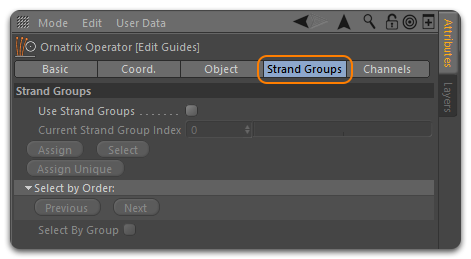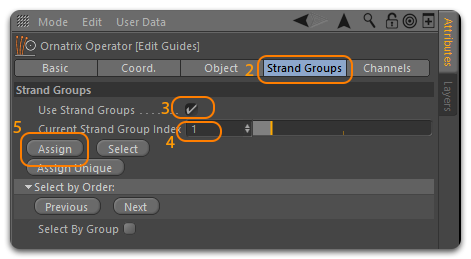Strand Groups
A strand group is an integer value assigned to each guide or hair strand. Strands belonging to a specific group can be edited separately by various Ornatrix operators. Ornatrix operators provide an option to specify one or more groups which it will apply to. You can use multiple operators stacked on top of each other to separately style hairs belonging to different groups.
For example, you can have half of your character's hairs belong to group 1 and another half to group 2. Two Change Width modifiers can then be added, one which works on group 1 and another on group 2. One operator can change the first half of the hairs width to be thinner while the second operator can change the second half of the hair to be thicker.

Specifying Strand Groups
The most typical way to specify strand groups is to do it on guides, but strand groups can also be created directly on hair strands if Edit Guides modifier is added on top of Hair From Guides modifier. To do this:- In Edit Guides modifier enter Roots mode and select one or more strands, you can also use the Selection brush in Brush mode.
- Go to the Strand Groups tab and check the "Use Strand Groups" box
- Use the Current Strand Group Index slider to choose a group where the selected strands will be included and click Assign
- Alternatively you can click Assign Unique and a unique strand group index will be assigned to the selected strands

If you are using Hair From Mesh Strips operator, you can use the per-strip controls to directly specify group index for individual strips.
You can also use the Generate Strand Data modifier to procedurally generate groups using an expression, a map, or even randomly.
Using strand groups
When using various hair operators in Ornatrix you can specify a Strand Group parameter to them.

The value of this parameter will determine to which strands the operator will be applied. This parameter can specify a single group, or a pattern of groups as described below. An empty value, or a value of 0 will apply the operator to all strands which do not have a group assigned. In other words, 0 is the default strand group index.
Strand Group Patterns
Strand Group Patterns allow you to create different combinations of strand groups.
The following is a list of combinations that can be used for strand group management.
- Single groups:
Enter a single value to affect a single strand group. - Multiple groups:
Enter two or more values separated by a comma to add multiple groups. I.e. 1, 3, 5 will add groups 1, 3 and 5. - Range of groups:
Use a colon to specify a range of groups. I.e. 1:5. This combination will add the groups from 1 to 5. - All groups except one:
Exclude a single group. I.e., use ^4 to exclude group number 4. - Range of groups with a single stride:
Add a range of groups with a stride by using a colon to separate each group. I.e. 1:10:2. - All groups higher than:
Use a plus (+) symbol to add all groups higher than the entered value. I.e. +2 will add all groups starting from group number 2. - Excluding a range of groups:
Is possible to exclude a range of groups. I.e. ^4:6 will exclude from group number 4 to number 6. - Single group and a range:
Include a single group and a range by entering a single value followed by a range separated by a comma. I.e. 1,3:5 will include group number 1 and jump to a range from group number 3 to number 5.


